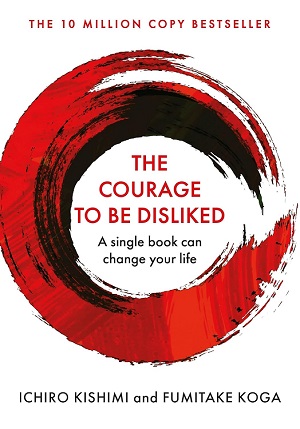The Courage to Be Disliked by Ichiro Kishimi and Fumitake Koga is a transformative book that presents a profound philosophical dialogue based on the teachings of Alfred Adler, one of the founders of individual psychology. Through an engaging conversation between a philosopher and a young man, the book explores deep insights into human behavior, personal freedom, and the pursuit of happiness. Below are exploration of 20 key lessons from the book:

Read: Professional Troublemaker
1. The Concept of Separation of Tasks
Key Insight: One of the central ideas in the book is the “separation of tasks.” It teaches that most of the stress and unhappiness in life comes from interfering with tasks that are not ours to handle. We must learn to distinguish between what is our responsibility and what is not.
Actionable Tip: Focus on your own tasks and let others handle theirs. For example, your task is to do your best at work, but it is not your task to make everyone like you. This practice can reduce unnecessary stress and help you focus on what truly matters.
2. The Courage to Be Disliked
Key Insight: The book emphasizes that to live a fulfilling and authentic life, one must develop the courage to be disliked by others. Trying to please everyone leads to a life of compromise and unhappiness.
Actionable Tip: Embrace your true self and make decisions based on your values, not on others’ approval. Understand that not everyone will like or agree with you, and that’s okay. The more you accept this, the more authentic and happier you will become.
3. Living in the Present Moment
Key Insight: According to Adlerian psychology, people are not determined by their past. Instead, they are driven by their goals and aspirations for the future. The book encourages focusing on the present and taking action towards your goals, rather than being weighed down by past events.
Actionable Tip: Practice mindfulness and concentrate on what you can do now to move towards your desired future. Let go of past regrets and worries about the future, and focus on taking positive steps today.
4. The Freedom to Choose Your Path
Key Insight: The book argues that everyone has the freedom to choose their path in life, regardless of past experiences or circumstances. It’s not external factors that shape your life, but your own choices and attitudes.
Actionable Tip: Reflect on your life and identify areas where you feel stuck or limited by external circumstances. Recognize that you have the power to change your situation by making different choices and adopting a positive attitude.
5. All Problems Are Interpersonal Relationship Problems
Key Insight: The philosopher in the book suggests that all personal problems are, at their core, problems with interpersonal relationships. This includes issues with family, friends, coworkers, and society at large.
Actionable Tip: When faced with a personal problem, consider how it relates to your relationships with others. Work on improving communication, setting boundaries, and understanding different perspectives to resolve conflicts and reduce stress.
6. Overcoming the Inferiority Complex
Key Insight: Many people suffer from an inferiority complex, believing they are less capable or worthy than others. The book explains that these feelings are often self-imposed and can be overcome by focusing on self-acceptance and personal growth.
Actionable Tip: Challenge your negative self-beliefs by recognizing your strengths and achievements. Set realistic goals for self-improvement and focus on progress rather than perfection. Remember that everyone has unique strengths and weaknesses.
7. Don’t Live to Satisfy Others’ Expectations
Key Insight: The book emphasizes the importance of not living your life according to others’ expectations. Trying to meet others’ demands and standards can lead to a life of dissatisfaction and unfulfillment.
Actionable Tip: Identify areas in your life where you are making decisions based on what others expect rather than what you truly want. Begin making choices that align with your own values and desires, even if it means disappointing others.
8. The Concept of “The Goal of Life”
Key Insight: According to Adlerian psychology, everyone has a “goal of life” that guides their actions and decisions. This goal is often unconscious, but it can be uncovered and aligned with one’s true desires to live a more fulfilling life.
Actionable Tip: Reflect on your current actions and decisions. Ask yourself what ultimate goal they are serving. If your actions are not leading to fulfillment or happiness, consider redefining your life’s goals to better align with your true self.
9. The Pursuit of Happiness Through Contribution
Key Insight: The book teaches that true happiness comes from contributing to others and society. When you shift your focus from self-centered goals to helping others, you experience a deeper sense of purpose and fulfillment.
Actionable Tip: Look for ways to contribute to the well-being of others, whether through volunteer work, offering support to friends and family, or simply being kind and generous in your daily interactions. Contribution creates a sense of belonging and enhances personal happiness.
10. Self-Acceptance and Avoiding Comparisons
Key Insight: The book highlights the importance of self-acceptance and warns against the dangers of comparing yourself to others. Comparisons often lead to feelings of inadequacy and envy, which can harm your self-esteem and happiness.
Actionable Tip: Practice self-acceptance by embracing your unique qualities and achievements. Instead of comparing yourself to others, focus on your personal growth and progress. Celebrate your strengths and work on your weaknesses without self-judgment.
11. The Concept of “Horizontal Relationships”
Key Insight: In contrast to “vertical relationships” where one person is above or below another (e.g., superior-subordinate), the book advocates for “horizontal relationships” based on mutual respect and equality. This approach fosters healthier and more fulfilling connections.
Actionable Tip: Strive to build horizontal relationships in your personal and professional life. Treat others as equals, respect their opinions, and seek collaborative solutions. This can lead to more meaningful and positive interactions.
12. The Role of Encouragement
Key Insight: Encouragement is a powerful tool for personal growth and building positive relationships. The book emphasizes that encouragement, both self-encouragement and encouraging others, is key to overcoming challenges and achieving goals.
Actionable Tip: Practice self-encouragement by acknowledging your efforts and progress, even when you fall short. Similarly, encourage others by recognizing their strengths and offering support when they face difficulties. Encouragement fosters confidence and resilience.
13. Living for the Moment, Not the Outcome
Key Insight: The book teaches that happiness comes from living in the moment rather than being fixated on outcomes. By focusing on the process and the present, you can find joy and satisfaction in the journey itself.
Actionable Tip: Shift your focus from being solely goal-oriented to enjoying the process. Whether it’s work, hobbies, or relationships, find pleasure in the actions you take today, rather than only in the final result. This mindset can reduce stress and enhance your overall well-being.
14. Understanding “Life Lies”
Key Insight: The book introduces the concept of “life lies,” which are false beliefs or excuses we create to avoid taking responsibility for our lives. These lies can prevent us from pursuing our true potential and finding happiness.
Actionable Tip: Reflect on any “life lies” you may be telling yourself, such as “I’m too old to change careers” or “I can’t be happy unless others approve of me.” Challenge these beliefs and take steps to overcome them, freeing yourself to live a more authentic and fulfilling life.
15. The Concept of “Living in Harmony with Society”
Key Insight: The book advocates for living in harmony with society, which involves contributing to the greater good while maintaining your individuality. This balance is essential for both personal fulfillment and social harmony.
Actionable Tip: Consider how your actions impact others and society as a whole. Strive to make decisions that benefit not only yourself but also those around you. This approach can lead to a more harmonious and fulfilling life.
16. The “Here and Now” Philosophy
Key Insight: A recurring theme in the book is the importance of living in the “here and now.” Focusing on the present moment, rather than dwelling on the past or worrying about the future, is crucial for finding happiness and peace.
Actionable Tip: Practice mindfulness by fully engaging with your current activities and surroundings. Let go of past regrets and future anxieties, and immerse yourself in the present moment. This can enhance your sense of peace and contentment.
17. Taking Responsibility for Your Own Life
Key Insight: The book teaches that you are the only one responsible for your life and happiness. Blaming others or circumstances only disempowers you. Taking responsibility allows you to take control and create the life you want.
Actionable Tip: Reflect on areas of your life where you feel disempowered or stuck. Identify how you might be blaming external factors and instead take responsibility for making changes. Empower yourself by recognizing that you have the ability to shape your life.
18. The Impact of “Community Feeling”
Key Insight: “Community feeling” is a concept from Adlerian psychology that emphasizes the importance of feeling connected to and contributing to a larger community. This sense of belonging is vital for personal well-being and happiness.
Actionable Tip
: Foster a sense of community by engaging with others, participating in group activities, or contributing to causes you care about. Building connections with others can enhance your sense of belonging and purpose.
19. Self-Reliance and Independence
Key Insight: The book encourages developing self-reliance and independence, rather than relying on others for approval or validation. True freedom and happiness come from within, not from external sources.
Actionable Tip: Work on becoming more self-reliant by trusting your own judgment and making decisions based on your values. Seek internal validation rather than relying on others for approval. This approach can lead to greater confidence and personal freedom.
20. The Pursuit of Happiness
Key Insight: The ultimate lesson of the book is that happiness is a choice and a byproduct of living authentically, contributing to others, and embracing the courage to be disliked. By freeing yourself from the need for approval and focusing on what truly matters, you can achieve real happiness.
Actionable Tip: Focus on creating a life that aligns with your true self, values, and goals. Prioritize your happiness by making choices that bring you joy and fulfillment, regardless of what others think. True happiness comes from within and is cultivated through authentic living.
Conclusion
By embracing these lessons from The Courage to Be Disliked by Ichiro Kishimi and Fumitake Koga, you can transform your approach to life, relationships, and personal happiness. The book offers profound insights into the nature of human behavior, the importance of personal freedom, and the pursuit of a fulfilling life. Whether you are seeking to overcome challenges, build healthier relationships, or achieve true happiness, these lessons provide a comprehensive guide to living a more authentic and empowered life.



